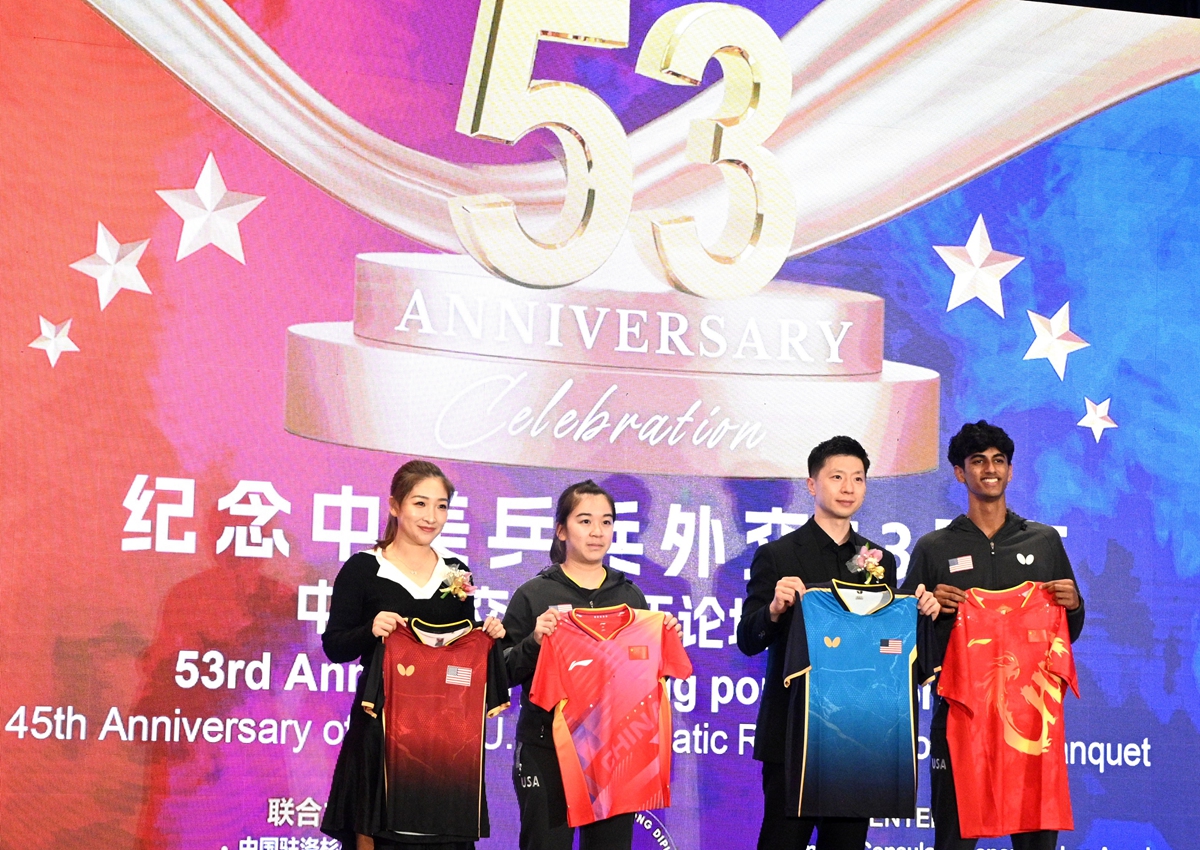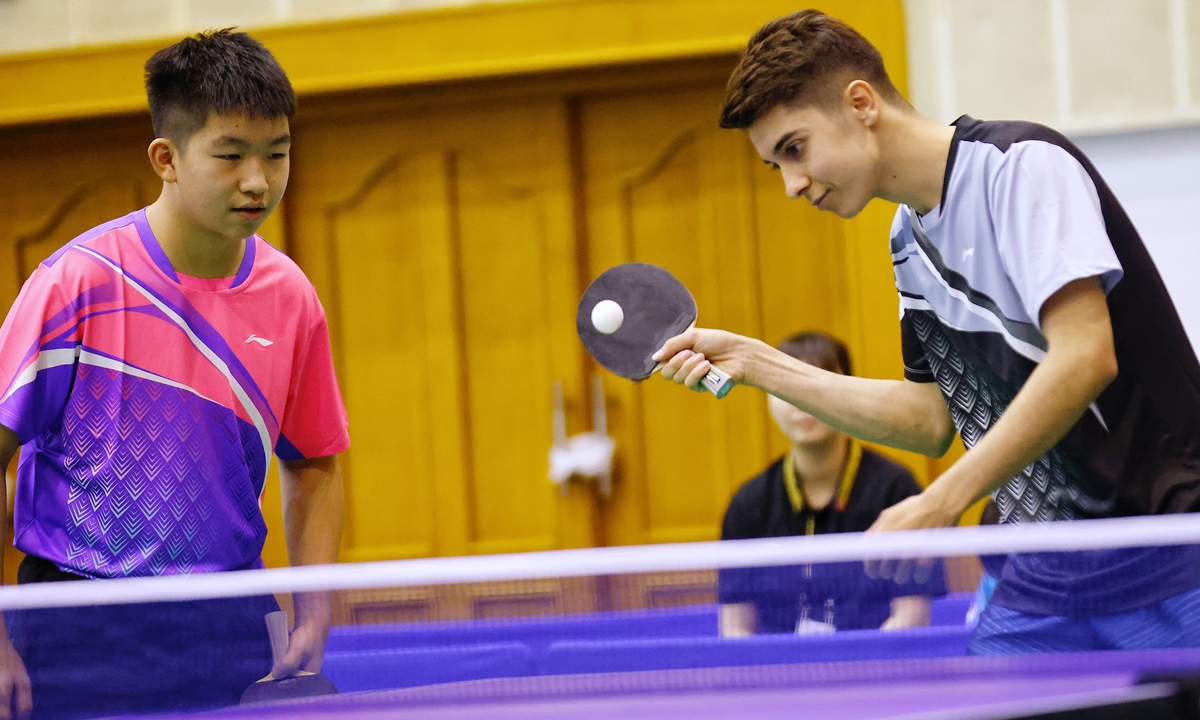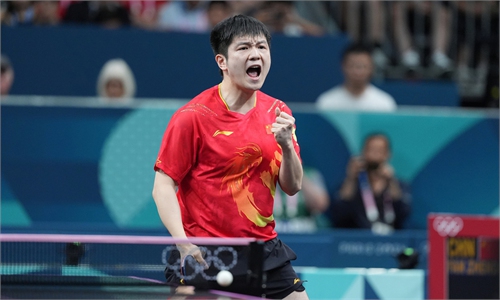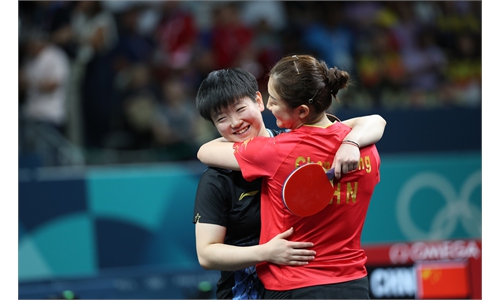ARTS / CULTURE & LEISURE
‘Unifying power of sports’: Celebrating Ping-Pong Diplomacy’s legacy of friendship

Chinese table tennis stars Liu Shiwen (first from left) and Ma Long (second from right) pose for photos in an event to commemorate the 53rd anniversary of China-US "Ping-Pong Diplomacy" in Los Angeles on December 24, 2024. Photo: cnsphoto
At the ping-pong table, Chinese table tennis players Ma Long and Liu Shiwen pick up their paddles to partner in a mixed doubles match. If you are a seasoned ping-pong fan, you might find this scene a bit strange as they are not dressed in sportswear, but black formal attire instead. They were in Los Angeles, engaged in a friendly match with American veteran ping-pong players.Fifty-three years on, the Chinese and Americans are honoring the "Ping-Pong Diplomacy" legacy. Hundreds of Chinese and American people, including lawmakers, diplomats, and world champions, gathered in Los Angeles County's Pacific Palms Resort on Sunday to commemorate the 53rd anniversary of "Ping-Pong Diplomacy."
"Fifty-three years ago, table tennis carried the message of friendship between the Chinese and American players and started exchanges between the two peoples, opening a historic chapter of 'Ping-Pong Diplomacy,'" Gao Zhidan, director of the General Administration of Sport of China and president of the Chinese Olympic Committee, said in a letter for the event.

A Chinese boy and his US teammate take part in a table tennis match on July 14, 2024 in Beijing. Photo: VCG
Magic of ping-pongIn April 1971, nine players from the US Table Tennis team took a historic trip to China, becoming the first delegation of Americans to visit China in decades.
Their trip marked the beginning of what became known as the "Ping-Pong Diplomacy," and helped lay the groundwork for the establishment of official diplomatic relations between the People's Republic of China and the US. The legacy also led to improved people-to-people understanding and cultural exchanges between the two countries.
Gao noted that the "amicable moment" had transcended time and space, saying it had not only changed the China-US relations but also set an example of sports diplomacy worldwide.
Xu Yinsheng, honorary president of the International Table Tennis Federation (ITTF) who witnessed the "Ping-Pong Diplomacy" as then coach of Chinese ping-pong national team in the early 1970s, told the Global Times in a previous interview that he still remembered the time when US player Glenn Cowan mistakenly boarded a shuttle bus carrying the Chinese team during the match. The Chinese players were a bit surprised at the presence of this Hippie-haired young American.
"But we had no hostility toward him," said Xu.
The Chinese players showed Cowan their friendship and goodwill, he remembered.
Years on, the "Ping-Pong Diplomacy" "still provides a valuable reference for the two countries in dealing with the fluctuations in their relations," Xu said.
Gene Sykes, chair of the United States Olympic and Paralympic Committee Board of Directors, said that the "Ping-Pong Diplomacy" was "a pivotal moment that transcended sports and diplomacy."
"As we reflect on the recent Olympic and Paralympic Games in Paris, we are reminded of the unifying power of sports," Sykes said in a speech at the Sunday event in Los Angeles.
The impact of the "Ping-Pong Diplomacy" went far beyond sports, opening doors for collaboration and exchanges between the two countries which continue to shape mutual relations while inspiring people to create a more harmonious world, added Sykes.
Long-lasting legacy
Chinese Consul General in Los Angeles Guo Shaochun called it "an iconic moment in the China-US relationship" at the reception, according to the Xinhua News Agency.
"Although the relationship between the two countries has gone through ups and downs, it has always kept moving forward," Guo said, noting that China-US win-win cooperation was not only in line with the fundamental interests of the two countries and their peoples, but also aligned with the trend of the times.
The common interests of the two countries had not decreased but increased, Guo said, calling for drawing wisdom and strength from the "Ping-Pong Diplomacy" for a sound and stable China-US relationship since it was the right choice for the two countries, their peoples and the world.
After the friendship match with American veteran table tennis players, Chinese player Ma Long told China Central Television (CCTV) that he felt the affection and love for table tennis from these US players, who "knew almost every player on the Chinese team back then," and the friendship between them "has always been maintained."
Talking about the match, China's Olympic champion Liu Shiwen said, "I can imagine the scenes of them fighting hard on the court in the past. When we played against each other, I felt that it was a display and continuation of the spirit of table tennis."
The "Ping-Pong Diplomacy" creatively paved a way for the normalization of the China-US relations in those hard years filled with ideological confrontations.
"Its legacy continues to encourage us to pass on such friendship and cultural exchange as we are at the same global cultural pulse," Sun Jiashan, an associate researcher at the Central Academy of Culture and Tourism Administration, told the Global Times on Tuesday.




